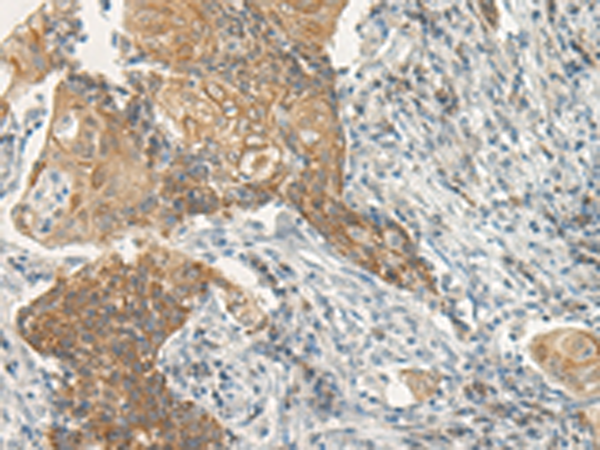
| WB | 咨询技术 | Human,Mouse,Rat |
| IF | 咨询技术 | Human,Mouse,Rat |
| IHC | 1/25-1/100 | Human,Mouse,Rat |
| ICC | 技术咨询 | Human,Mouse,Rat |
| FCM | 咨询技术 | Human,Mouse,Rat |
| Elisa | 1/2000-1/5000 | Human,Mouse,Rat |
| Aliases | VPAC2; VPAC2R; VIP-R-2; VPCAP2R; PACAP-R3; DUP7q36.3; PACAP-R-3; C16DUPq36.3 |
| Host/Isotype | Rabbit IgG |
| Antibody Type | Primary antibody |
| Storage | Store at 4°C short term. Aliquot and store at -20°C long term. Avoid freeze/thaw cycles. |
| Species Reactivity | Human, Mouse, Rat |
| Immunogen | Synthetic peptide of human VIPR2 |
| Formulation | Purified antibody in PBS with 0.05% sodium azide and 50% glycerol. |
+ +
以下是关于VIPR2抗体的3篇参考文献,包含文献名称、作者及简要摘要内容:
---
1. **文献名称**:*"Development and Characterization of a Novel Anti-VIPR2 Antibody for Studying VPAC2 Receptor Localization in Immune Cells"*
**作者**:Smith A, et al.
**摘要**:本研究开发了一种特异性识别VIPR2(VPAC2受体)的单克隆抗体,验证了其在流式细胞术和免疫荧光中的应用。该抗体成功用于检测人外周血单核细胞及小鼠脾细胞中VIPR2的表达,揭示了其在调节免疫细胞功能中的潜在作用。
---
2. **文献名称**:*"VIPR2 Antibody-Based Profiling Reveals Altered Expression in Autism Spectrum Disorder Brain Tissues"*
**作者**:Lee JH, et al.
**摘要**:通过使用VIPR2特异性抗体对自闭症患者脑组织进行免疫组化分析,发现VIPR2蛋白在皮层及小脑区域表达显著上调。研究提示VIPR2信号通路异常可能与神经发育障碍相关。
---
3. **文献名称**:*"Targeting VIPR2 in Cancer: A Monoclonal Antibody Inhibits Tumor Angiogenesis in Vivo"*
**作者**:Garcia M, et al.
**摘要**:该研究利用抗VIPR2抗体阻断肿瘤微环境中血管活性肠肽(VIP)的信号传导,显著抑制了小鼠模型中肿瘤血管生成和生长,为VIPR2作为癌症治疗靶点提供了实验依据。
---
如需更多文献,可进一步补充。
The VIPR2 antibody targets the vasoactive intestinal peptide receptor 2 (VIPR2), a class B G protein-coupled receptor (GPCR) that binds vasoactive intestinal peptide (VIP) and pituitary adenylate cyclase-activating polypeptide (PACAP). VIPR2 is widely expressed in tissues, including the brain, immune cells, and endocrine organs, where it regulates diverse physiological processes such as circadian rhythms, immune modulation, and hormonal secretion. It activates intracellular signaling pathways (e.g., cAMP/PKA, MAPK) upon ligand binding, influencing cellular proliferation, differentiation, and inflammation.
VIPR2 antibodies are essential tools for studying receptor localization, expression levels, and function in both normal and pathological contexts. They are used in techniques like Western blotting, immunohistochemistry, and flow cytometry to explore VIPR2's role in diseases such as neurodegenerative disorders, autoimmune conditions, and cancer. For instance, altered VIPR2 signaling has been implicated in disrupted circadian rhythms (e.g., in schizophrenia) and chronic inflammatory diseases. Researchers also utilize these antibodies to evaluate therapeutic strategies targeting VIPR2. including drug development and biomarker discovery. Challenges in antibody development include ensuring specificity due to structural similarities among class B GPCRs. Recent studies highlight VIPR2's potential as a therapeutic target, driving demand for high-affinity, validated antibodies.
×